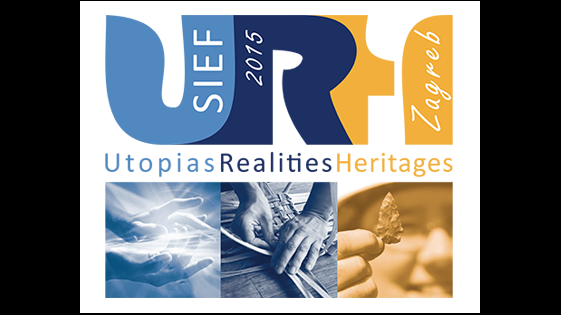Pracownicy i studenci IEiAK na SIEF 2015
Data dodania:
22-06-2015

Pracownicy i studenci naszego Instytutu biorą udział w SIEF 2015 12th Congress: Utopias, Realities, Heritages. Ethnographies for the 21st century, 21-25 czerwca 2015, Zagrzeb, Chorwacja.
Wystąpienia w panelach:
- Ruxandra Ana: Choreographing masculinities: embodied narratives in social and competitive dancing
The paper examines the (re)production of gendered and racialized bodies in the dance world, looking at construction and performance of masculinity in Cuban dance venues and the symbolic implications of the transnational dissemination of Cuban dance styles and ideas around male bodies. - Piotr Cichocki, Katarzyna Król: Digital church. The speculative fieldwork
The installation documents speculative ritual performed in interaction of human and technology has developed from “binaural tunes” - sound loops that are claimed to induce desirable mental states. We concentrate on these elements of ritual, which can be interpreted as embodiement (Csordas). - Karolina Bielenin-Lenczowska: Macedonian Poreche between idyllic imaginaries and post-socialist realities: reflections from an ethnographic revisit
Poreche is a rural region in Macedonia. Since the collapse of Yugoslavia people have encountered economic difficulties and have felt marginalized by political institutions. Along with narratives about everyday problems go idyllic imaginaries of the beauty of the region and its “Macedonianess”. - Agnieszka Halemba: The moral value of dissidence: apparitions of the Virgin Mary and socialist repressions
The focus is on Marian apparitions under socialism that have been less analyzed than those on the western side of the Iron Curtain. On the basis of recent ethnographic fieldwork, it is also shown how presently the socialist period is a tool for legitimization of apparitions in Ukraine. - Renata Ewa Hryciuk: Food, heritage politics and Indian women: a case study of culinary tourism in Oaxaca (Mexico)
Based on the results of extended fieldwork this paper focuses on the workings of heritage politics in a local context of (post)colonial yet transnational society of Oaxaca (Southern Mexico). - Ewa Klekot: Pottery design workshop as a place of knowledge exchange,
The paper will present the experience of collaborative work between an anthropologist and a pottery designer working with design students and village potters of two generations in an old pottery centre in Poland. It will discuss the methods of work and the knowledge acquired during the workshop. - Katarzyna Król: Narration on the state: the case study of hand made tea in Georgia Katarzyna Król
Paper concentrates on the hand made tea produced in Georgia. By concentrating on technology, knowledge production and transmission asks a question about social and economic change and role of the state in postsocialist country. - Oskar Lubinski: Cuban heritage tourism and private businesses: surviving in a subsistence economy?
The aim of the paper is to provide insight on how the development of tourism in some of the heritage sites in Cuba provides opportunities to Cubans to earn revenue by renting their house but at the same time generates inequalities in the host community. - Helena Patzer: The balikbayan: migration imaginaries and nation-branding in the Philippines
In the paper I will discuss the figure of the balikbayan who embodies the imaginaries of migration in the Philippines, and the positive branding of migration by the state. I will also analyze the expectations connected with ”going abroad” - that opportunity awaits just beyond the border. - Justyna Szymańska: ‘New’ Ukraine and homo sovieticus: political and social dimensions of national and ethnic identities
The ongoing political crisis in Ukraine has been a trigger for re-thinking the question of identity of citizens of its Eastern regions – an appearance inspired mostly by differences in approach towards issues such as history, memory, strategies of memorialisation and communist past. - Joanna Urbańczyk: Last Testament Church: Utopian endeavours of the followers of Vissarion
Presentation is the result of 9-month participant observation fieldwork in the Siberian centre of the Last Testament Church conducted in 2012-13. It will focus on the movement’s attempt at establishing a model society of the future based on the eclectic teachings of Vissarion. - Joanna Zamorska: Patrons saints, prestige and power: changes in fiesta organizing in the central valleys of Oaxaca, Mexico
The paper discusses changes in the fiesta organizing in three suburban communities in Oaxaca, Mexico. I will focus on the increased recognition of women’s participation in fiesta organizing, which results in changes in the power relations and constructing prestige in local communities. - Magdalena Zatorska: Ciulim, cholent and the uses of idealized Polish-Jewish past in local politics of history
The aim of the proposed paper is to analyze cultural functioning of ciulim, traditional local food prepared in Lelów (Częstochowa County, Silesia Voivodeship in the Southern Poland) and to describe how it is used to create idealized Polish-Jewish past in local politics of history.


